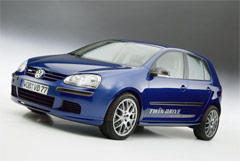Volkswagen unveiled Thursday a hybrid-drive car that can be charged up through an electrical power socket.
The test system, code-named TwinDrive and installed in a regular Volkswagen Golf compact car, is to be tried out till 2012, Volkswagen chief executive Martin Winterkorn said in the German capital Berlin.
After years of insisting that diesel engines were the answer, German car companies have rushed in recent months to develop hybrid cars, which have both electric motors and internal-combustion engines.
The electric motor in the Twin Drive produces a peak output of 82hp (61kW) and allows the Golf to reach a top speed of 120km/h. The motor runs on an array of fast-charging lithium-ion batteries that can be charged from a regular household power outlet. On electric power alone the car can travel up to 50km, enough for most daily trips, but once the batteries are depleted a 122hp (91kW) 2.0L turbodiesel engine takes over.
Four weeks ago, Volkswagen linked with Sanyo of Japan to jointly develop lithium ion batteries to store the electrical charge.
Unlike the Toyota Prius, which generates all its electricity on board using a petrol engine, the Volkswagen TwinDrive can also top up its battery while parked, using the public electricity grid.
Volkswagen said it would only use power generated from renewable sources such as sunshine, wind and hydro dams.
The company is to build 20 of the test cars, which are planned to have an electric-only range of 50 kilometres before the internal-combustion engine must be started up.
Germany's Environment Ministry is pumping 15 million euros (24 million dollars) into the research project, which has eight partners including Volkswagen and will cost a total 45 million euros.
Power company E.ON said motor transport using networked electricity would cost only half as much as using liquid fuel.
The rising price of oil and scientific advances in rechargeable battery research have put a focus back on the batteries.
From 2010, General Motors of the United States is planning to manufacture and sell a car, the Chevy Volt, which is purely electric.
'Emission-free, all-electric driving is possible nowadays, but with limited speed and range. That is why new batteries have to be developed that are suited in their capacity, size, weight and cost to the cars of tomorrow,' VW said at the time of the Sanyo announcement. .

